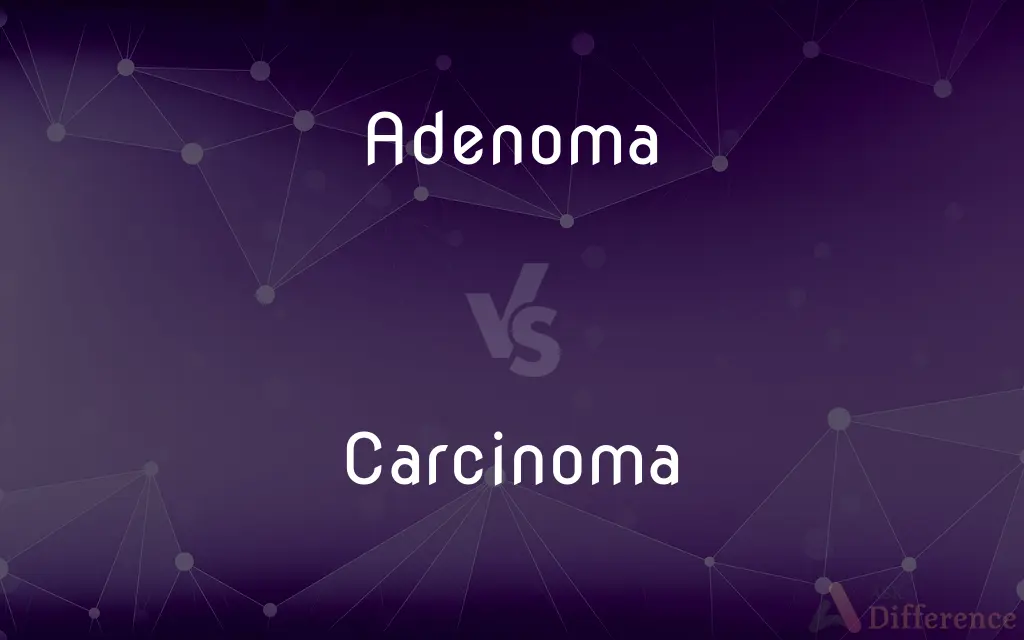Adenoma vs. Carcinoma — What's the Difference?
Edited by Tayyaba Rehman — By Fiza Rafique — Updated on September 26, 2023
Adenoma is a benign tumor arising from glandular tissue, while Carcinoma is a malignant tumor derived from epithelial cells, often with the ability to metastasize.

Difference Between Adenoma and Carcinoma
Table of Contents
ADVERTISEMENT
Key Differences
Adenoma primarily refers to benign growths that originate from glandular tissue. This means that these tumors are non-cancerous and do not invade neighboring tissues nor spread to distant sites. Carcinoma, contrastingly, indicates a type of cancer arising from epithelial cells, which line our organs and structures in the body.
The major distinction between Adenoma and Carcinoma centers around their behavior. Adenomas usually remain localized, posing minimal risks if removed promptly. Carcinomas, however, are aggressive, with potential to invade surrounding tissues and metastasize, or spread, to distant parts of the body.
Both Adenoma and Carcinoma can manifest in various parts of the body, given the ubiquitous nature of glandular and epithelial tissues. For instance, a polyp in the colon may be termed an adenomatous polyp. If such an Adenoma undergoes malignant transformation, it may develop into a colorectal Carcinoma.
Comparison Chart
Nature
Benign tumor.
Malignant tumor.
Origin
Arises from glandular tissue.
Derived from epithelial cells.
ADVERTISEMENT
Behavior
Does not invade or metastasize.
Can invade and metastasize.
Examples
Adenomatous polyp in the colon.
Basal cell Carcinoma of the skin.
Management
Monitoring or removal.
Surgery, chemotherapy, radiation, etc.
Compare with Definitions
Adenoma
Adenoma is a benign glandular tumor.
The biopsy confirmed the presence of an Adenoma in the patient's thyroid.
Carcinoma
Carcinoma has the ability to metastasize.
The Carcinoma had spread to the nearby lymph nodes.
Adenoma
Adenoma doesn't typically invade surrounding tissues.
The Adenoma remained localized and was easily excised.
Carcinoma
Carcinoma can arise in any body part with epithelial cells.
He was diagnosed with renal Carcinoma after the scan.
Adenoma
Adenoma can develop in various organs with glandular tissue.
The liver Adenoma was identified during a routine checkup.
Carcinoma
Carcinoma demands aggressive treatment approaches.
She underwent chemotherapy to treat the Carcinoma.
Adenoma
Adenoma might need removal to prevent potential malignancy.
Doctors advised removing the Adenoma as a precaution.
Carcinoma
Carcinoma is a cancerous tumor from epithelial origin.
The patient was diagnosed with a Carcinoma of the lung.
Adenoma
Adenoma often requires monitoring over time.
She had regular check-ups to monitor the growth of the Adenoma.
Carcinoma
Carcinoma's growth and spread can be rapid.
The Carcinoma progressed faster than anticipated.
Adenoma
An adenoma is a benign tumor of epithelial tissue with glandular origin, glandular characteristics, or both. Adenomas can grow from many glandular organs, including the adrenal glands, pituitary gland, thyroid, prostate, and others.
Carcinoma
Carcinoma is a malignancy that develops from epithelial cells. Specifically, a carcinoma is a cancer that begins in a tissue that lines the inner or outer surfaces of the body, and that arises from cells originating in the endodermal, mesodermal or ectodermal germ layer during embryogenesis.Carcinomas occur when the DNA of a cell is damaged or altered and the cell begins to grow uncontrollably and become malignant.
Adenoma
A benign epithelial tumor having a glandular origin and structure.
Carcinoma
An invasive malignant tumor derived from epithelial tissue that tends to metastasize to other areas of the body.
Adenoma
(pathology) A benign tumour of the epithelium arising from or resembling a gland.
Carcinoma
(countable) An invasive malignant tumour derived from epithelial tissue that tends to metastasize to other areas of the body.
Adenoma
A benign tumor of a glandlike structure; morbid enlargement of a gland.
Carcinoma
A form of cancer; (uncountable) cancer in general as a disease.
Adenoma
A benign epithelial tumor of glandular origin
Carcinoma
A form of malignant cancer arising from epithelial tissue. The term was earlier applied to all forms of cancer, or to certain non-malignant forms. It is contrasted with sarcoma, a malignant form of cancer arising from connective tissue. See Cancer.
Carcinoma
Any malignant tumor derived from epithelial tissue; one of the four major types of cancer
Common Curiosities
Which tumor can metastasize?
Carcinoma can metastasize or spread to distant sites.
What is the main difference between Adenoma and Carcinoma?
Adenoma is benign and arises from glandular tissue, while Carcinoma is malignant and originates from epithelial cells.
Is Carcinoma always dangerous?
Carcinomas are cancerous and can be aggressive, with the potential to spread, making them concerning.
Is Adenoma cancerous?
No, Adenoma is a benign tumor of glandular origin.
Can Adenoma transform into Carcinoma?
Yes, in some cases, untreated or certain types of Adenomas can transform into Carcinomas.
Is regular monitoring necessary after diagnosing Adenoma?
Yes, Adenomas often require regular monitoring to track their growth or changes.
What treatments are common for Carcinoma?
Carcinomas might be treated with surgery, radiation, chemotherapy, targeted therapies, or a combination.
Is Carcinoma always derived from an existing Adenoma?
No, while some Carcinomas can develop from Adenomas, not all Carcinomas have a preceding Adenoma.
What cells give rise to Carcinoma?
Carcinomas arise from epithelial cells.
Can surgery treat both Adenoma and Carcinoma?
Surgery can be employed to remove Adenomas and certain types of Carcinomas, depending on their stage and location.
Can Adenoma cause symptoms?
Some Adenomas might cause symptoms depending on their size and location, while others remain asymptomatic.
Are there different types of Carcinoma?
Yes, there are various types of Carcinoma, like basal cell, squamous cell, and renal cell Carcinomas, based on their origin.
Are regular check-ups essential after treating Carcinoma?
Yes, regular check-ups are crucial after Carcinoma treatment to monitor for recurrence or metastasis.
How is Adenoma typically diagnosed?
Adenoma might be identified through imaging or biopsies and confirmed with histological studies.
Do all Adenomas need to be removed?
Not all Adenomas need removal, but some are excised as a precaution or if they cause symptoms.
Share Your Discovery

Previous Comparison
Conjecture vs. Speculation
Next Comparison
Delicious vs. NiceAuthor Spotlight
Written by
Fiza RafiqueFiza Rafique is a skilled content writer at AskDifference.com, where she meticulously refines and enhances written pieces. Drawing from her vast editorial expertise, Fiza ensures clarity, accuracy, and precision in every article. Passionate about language, she continually seeks to elevate the quality of content for readers worldwide.
Edited by
Tayyaba RehmanTayyaba Rehman is a distinguished writer, currently serving as a primary contributor to askdifference.com. As a researcher in semantics and etymology, Tayyaba's passion for the complexity of languages and their distinctions has found a perfect home on the platform. Tayyaba delves into the intricacies of language, distinguishing between commonly confused words and phrases, thereby providing clarity for readers worldwide.
















































